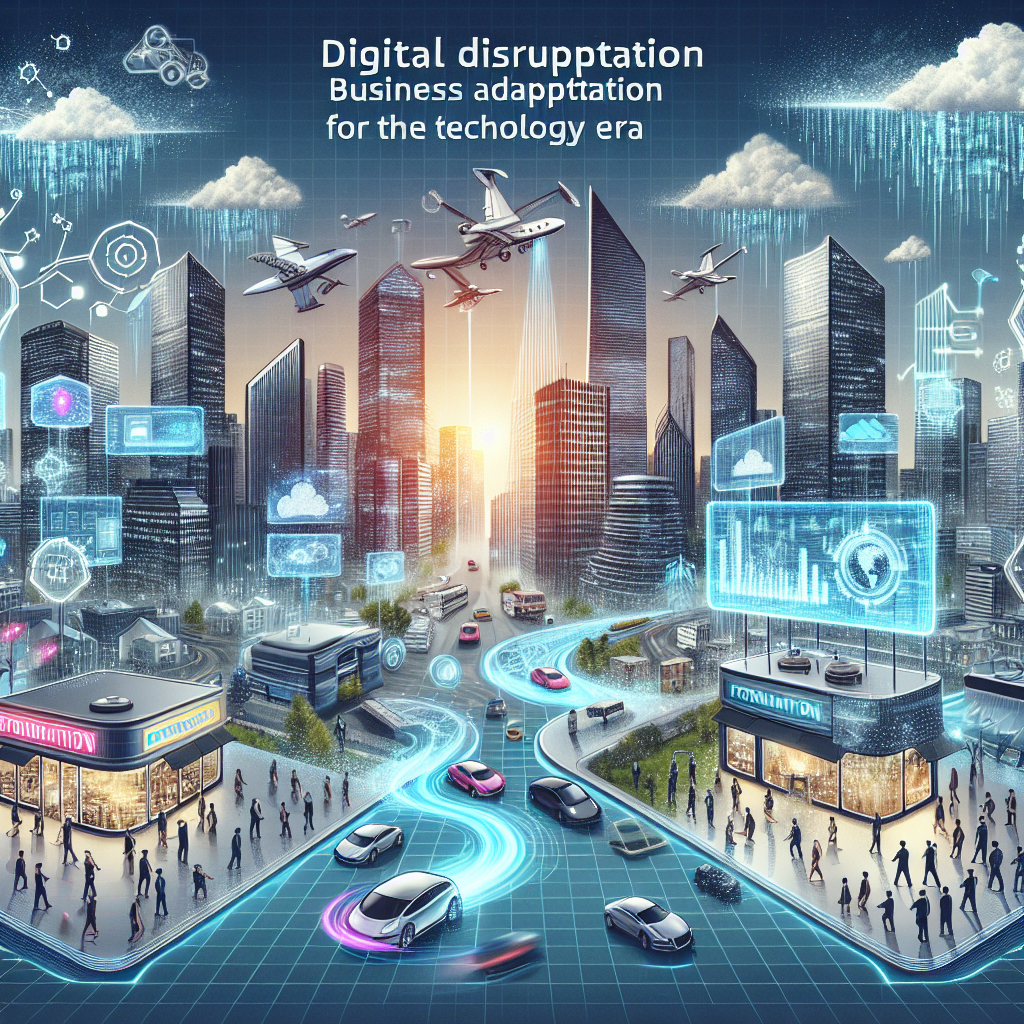Buku ini membahas strategi adaptasi bisnis dalam menghadapi perubahan teknologi yang mengganggu industri secara digital.
Digital Disruption: Adaptasi Bisnis untuk Bertahan di Era Teknologi
-
Table of Contents
- Introduction
- The Rise of Digital Disruption in Indonesia
- 1. Changing Consumer Behavior
- 2. Disruptive Startups
- Adapting to Digital Disruption
- 1. Embrace Digital Transformation
- 2. Invest in Innovation
- 3. Collaborate with Startups
- 4. Focus on Customer Experience
- The Benefits of Embracing Digital Disruption
- 1. Increased Efficiency
- 2. Expanded Market Reach
- 3. Enhanced Customer Engagement
- 4. Competitive Advantage
- Conclusion
Introduction

Digital disruption has become a buzzword in recent years, and for good reason. The rapid advancement of technology has revolutionized the way businesses operate, forcing them to adapt or risk becoming obsolete. In Indonesia, a country with a growing digital economy, businesses must embrace digital disruption to survive and thrive in this era of technology.
The Rise of Digital Disruption in Indonesia
Indonesia has experienced a significant increase in internet penetration over the past decade. According to a report by We Are Social and Hootsuite, the number of internet users in Indonesia reached 175 million in 2020, representing a penetration rate of 64%. This growing digital population has created a fertile ground for digital disruption to take place.
1. Changing Consumer Behavior
One of the key drivers of digital disruption in Indonesia is the changing behavior of consumers. With increased access to the internet, Indonesians are now more connected than ever before. They are using their smartphones and other digital devices to research products, compare prices, and make purchases online. This shift in consumer behavior has forced traditional businesses to rethink their strategies and embrace digital technologies to meet the evolving needs of their customers.
2. Disruptive Startups
Another factor contributing to digital disruption in Indonesia is the rise of disruptive startups. These startups leverage technology to create innovative business models that challenge established industries. For example, Gojek, a ride-hailing and on-demand services platform, has disrupted the transportation industry by providing affordable and convenient transportation options to millions of Indonesians. Similarly, Tokopedia, an e-commerce platform, has transformed the retail industry by connecting small businesses with a large customer base.
Adapting to Digital Disruption
To survive and thrive in the era of digital disruption, businesses in Indonesia must adapt their strategies and embrace digital technologies. Here are some key steps they can take:
1. Embrace Digital Transformation
Digital transformation involves integrating digital technologies into all aspects of a business, from operations to customer experience. This may include implementing cloud computing, adopting data analytics, and leveraging artificial intelligence. By embracing digital transformation, businesses can streamline their operations, improve efficiency, and deliver a better customer experience.
2. Invest in Innovation
Innovation is crucial for businesses to stay ahead in the digital age. Companies should invest in research and development to create new products and services that meet the changing needs of their customers. They should also foster a culture of innovation within their organizations, encouraging employees to think creatively and come up with new ideas.
3. Collaborate with Startups
Collaborating with startups can be a win-win situation for both established businesses and startups. Established businesses can benefit from the innovative ideas and technologies that startups bring to the table, while startups can gain access to the resources and expertise of established businesses. By forming strategic partnerships with startups, businesses can accelerate their digital transformation and stay ahead of the competition.
4. Focus on Customer Experience
In the digital age, customer experience is more important than ever before. Businesses should prioritize delivering a seamless and personalized experience to their customers across all digital touchpoints. This may involve investing in user-friendly websites and mobile apps, implementing chatbots for customer support, and leveraging data analytics to gain insights into customer preferences and behavior.
The Benefits of Embracing Digital Disruption
While digital disruption may seem daunting, there are several benefits that businesses in Indonesia can reap by embracing it:
1. Increased Efficiency
Digital technologies can automate manual processes, streamline operations, and improve efficiency. By embracing digital disruption, businesses can reduce costs and increase productivity, allowing them to allocate resources more effectively.
2. Expanded Market Reach
Digital disruption opens up new opportunities for businesses to expand their market reach. With the internet, businesses can reach customers beyond their physical locations and tap into new markets both domestically and internationally.
3. Enhanced Customer Engagement
Digital technologies enable businesses to engage with their customers in new and meaningful ways. Through social media, email marketing, and personalized recommendations, businesses can build stronger relationships with their customers and create a loyal customer base.
4. Competitive Advantage
By embracing digital disruption, businesses can gain a competitive advantage over their traditional counterparts. They can differentiate themselves by offering innovative products and services, providing a superior customer experience, and leveraging data analytics to make data-driven decisions.
Conclusion
Digital disruption is reshaping the business landscape in Indonesia. Businesses that fail to adapt to this new era of technology risk being left behind. By embracing digital transformation, investing in innovation, collaborating with startups, and focusing on customer experience, businesses can not only survive but thrive in the age of digital disruption. The benefits of embracing digital disruption are numerous, including increased efficiency, expanded market reach, enhanced customer engagement, and a competitive advantage. It is time for businesses in Indonesia to embrace digital disruption and seize the opportunities it presents.







